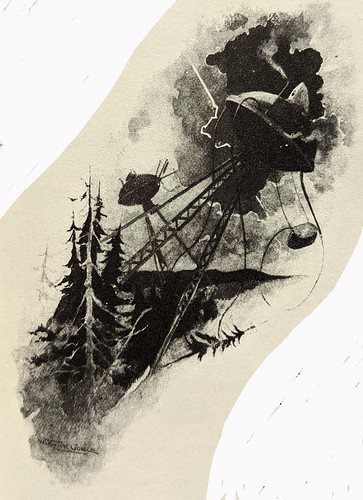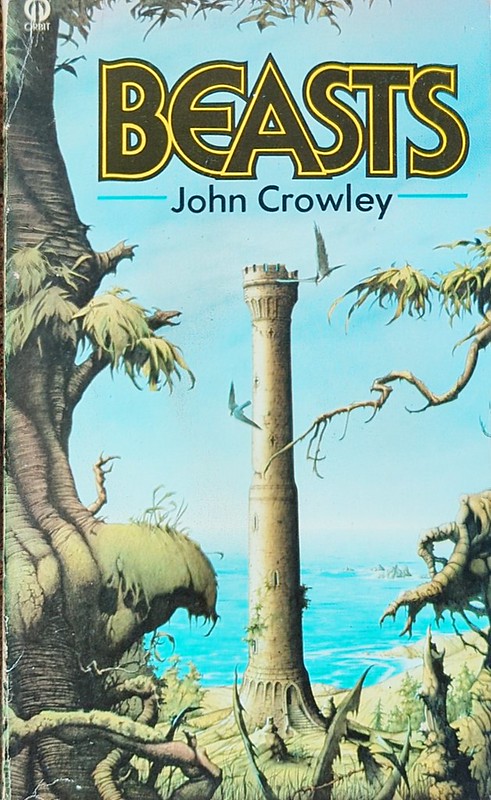
By H G Wells. It is famous, so I won't trouble you with a summary. Is it worth reading, nowadays? As a historical document; or as a description of it's times, yes. As a story? Only marginally.
The character of the times, or at least the bit Wells knew, can be told from this snippet near the start:
At that, he stood irresolute for a moment, then turned, scrambled out of the pit, and set off running wildly into Woking. The time then must have been somewhere about six o'clock. He met a waggoner and tried to make him understand, but the tale he told and his appearance were so wild - his hat had fallen off in the pit - that the man simply drove on. That's right: trying to talk to someone if you didn't have a hat on would make you appear "wild".
And the locations are desperately parochial: Woking, Leatherhead, Weybridge, Chertsey. Such a limited scope.
Quibble: what is the Martian strategy? To invade the Earth, clearly. So why land so close to London? It seems very risky: England has enough tech to destroy three of the "tripods", and really we don't even try very hard. Would it not be better to land in some remote primitive part of the Earth, build up strength there, and then branch out? Indeed, the Martians get pretty lucky - or if you prefer, unlucky: had they landed 100 years later, they'd have been totally stuffed by the tech we have now. But then again, 100 years earlier and we wouldn't be able to touch them. It seems an odd chance that they land then. The book's trope is that Mars is old, and dying: why didn't they land 10, 100, 1000 kyr ago?
What are they even trying to do? Initially they "heat ray" stuff, although why is rather unclear. Why not just be peaceful - at least until all your cylinders have landed - if no-one is threatening you? Or if you want to kill everyone, why not just land a giant gob of "black gas" in the center of London and kill everyone before you even land?
The answer of course is that the Martians don't have any coherent plan, that's not the point: the point is the human reaction to the Martian landing; and their "strategy" is designed - by Wells - around that, to produce an interesting plot, not to any functional purpose. My guess is that the thing was written in installments; it starts with the "heat ray", and after a bit he realises the obvious: that such a device, whilst deadly to any individual, isn't actually going to do much harm to a big city. So he has to invent "black gas" to get an area effect.
Quibble: leaving aside the problem that a "gun" for interplanetary transport really wouldn't work for a variety of reasons, there is: That night [at midnight] another invisible missile started on its way to the earth from Mars, just a second or so under twenty-four hours after the first one. First, it is a bizarre co-incidence that the "gun" should go off at exactly midnight local time. But second, why would the second be 24 hours from the first? Mars rotation period is 24 hours 39 minutes, so you'd expect that spacing (ignoring the slight movement of the planets in their orbits, which gives you a shift but not much of one).
Oddity: how do the "tripods" move? We have: And this Thing! How can I describe it? A monstrous tripod, higher than many houses, striding over the young pine trees, and smashing them aside in its wallowing career : a walking engine of glittering metal, reeling now across the heather ; articulate ropes of steel dangling from it, and the clattering tumult of its passage mingling with the riot of the thunder. A flash, and it came out vividly, heeling over one way with two feet in the air, to vanish and reappear almost instantly as it seemed, with the next flash, a hundred yards nearer. Can you imagine a milking stool tilted and bowled violently along the ground? So I think he envisages it stiff-legged, not articulated; moving by whirling about one fixed foot at a time. This is supported by the pix; though admittedly opposed by other talk which kinda has it bending down. I suspect he had no clear idea; the tech of the time gave him no model. They do have flexible articulated tentacles, but perhaps only for "horror" effect.
Quibble: towards the end, we discover that the Martians have no digestive system: instead they just inject blood. Which they get - schlock, horreur! - from people. But obviously not when on Mars or in transit, so Wells is forced to invent a race of bipeds-from-Mars, who have no purpose other than to feed the Martians.
Quibble: the Martians are killed by bacteria. This is a nice touch. It would have sufficed for them to have had millions of years of medicine and eradicated all disease and lost all immunity. But no! Wells goes, implausibly, further: the Martians have no bacteria at all. Pull the other one guv.
Borges
A fragment from the intro to Labyrinths: Many of his masters are English. He has an infinite admiration for Wells and is indignant that Oscar Wilde could define him as "a scientific Jules Verne." Borges makes the observation that the fiction of Jules Verne speculates on future probability (the submarine, the trip to the moon), that of Wells on pure possibility (an invisible man, a flower that devours a man, a machine to explore time), or even on impossibility (a man returning from the hereafter with a future flower). Beyond that, a Wells novel symbolically represents features inherent in all human destinies. Any great and lasting book must be ambiguous, Borges says; it is a mirror that makes the reader's features known, but the author must seem to be unaware of the significance of his work-which is an excellent description of Borges's own art. "God must not engage in theology; the writer must not destroy by human reasonings the faith that art requires of us." I find that hard to understand; the "Orchid" story that I think is referred to here was dull to read, and uninspired. To me, it seemed like a "hmm, there's all these new and somewhat weird plants coming in; what if... they were flesh eating?" And then, rather tediously, they try to eat him. Borges has also failed to notice that Wells has an (also rather dull) trip to the moon story.




